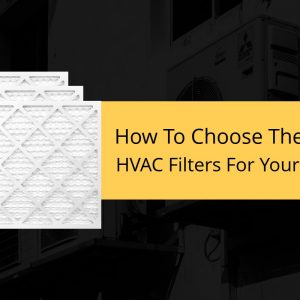
The air filter of each HVAC system is distinctive in its manner. All of us are well aware of the importance of an air filter in keeping the air you breathe clean and healthy. Because of this, you must be careful while choosing an HVAC air filter, whether it is a residential or commercial HVAC filter. In this article, you will find crucial information that is sure to help you make informed decisions about your HVAC air filters.
Understand The Types Of Air Filters
Fibreglass air filters are the most affordable option. These HVAC air filters have thin, flat surfaces that catch and remove airborne pollutants. However, they capture no more than 20% of pollutants: big particles such as dust, lint, and insects. When it comes to enhancing the quality of indoor air, these filters are less successful than others. MERV ratings for fibreglass air filters range only from 1 to 4.
Electrostatic air filters incorporate electrostatic cotton or paper fibres that attract and trap microscopic particles. These inexpensive filters in standard sizes are suitable for households with children, pets, and/or smokers. Typical MERV ratings for electrostatic air filters range between 6 and 8.
Pleated air filters remove 70 to 90% of indoor pollutants. They’re made of polyester or cotton paper. The more pleats, the better the cover. This filter must be replaced every three months. Pleated air filters are MERV 6-13.
Your residential air filter supplier should have all of these types and a few more.
Understand The Sizes Of Filters
There are numerous sizes of air filters available on the market, but it is vital to choose the proper one for your HVAC system. The performance and efficiency of your HVAC system may be negatively impacted by even a minor error in sizing. If the filter is too large or too small for the space, air will flow around it or through the spaces between. This will result in contaminated air travelling through your HVAC system and affecting your home’s air quality. To choose the right HVAC air filter size:
Check your furnace/air handler for a filter slot. Filters can also be found behind return vents in some homes. The dimensions of a furnace filter are determined by taking into account the filter’s length, width, and depth. For example, a filter could be 16 inches long, 25 inches wide and 1 inch thick. On the label, 16” × 25” × 1” would be written. A tape measure is all you need to take these measures. If you look at the filter that is already there, you can simply buy the same size.
Sometimes, residential air filters come in two different sizes, one of which is printed on the filter, and the other, an actual measurement that can be taken with a tape measure. The nominal size is determined by looking at the actual size and rounding up to the nearest whole number (sometimes a half-inch or more). Are you unsure about where to take your measurements? Between the return air duct and the furnace assembly, you’ll find the furnace filter slot (sometimes behind a removable door). Your home’s return air vent may also feature a filter slot.
Understand MERV Ratings
Ratings for HVAC filters are based on a minimum reported efficiency value (MERV). This rating ranges from 1 to 20, but the majority of residential HVAC filters fall between 4 and 12 on this scale. The smaller the particles that can be caught by the filter, the higher the rating. Additionally, filters with higher ratings impede airflow and are typically more expensive.
The optimal filter for you and your family will rely on the relative importance you place on comfort, cost, clean indoor air quality, and furnace performance. Most homeowners can choose MERV ratings between 6 and 8 without severely limiting airflow. The 6-8 range filters are still reasonably priced. Commercial HVAC filters are more expensive as they come with MERV ratings of 13 and above.
Consider Filter Replacement
The frequency of filter replacement will depend on a variety of factors, including the type and performance of the filter, the number of people and pets in your home, and your health conditions. Check the manufacturer’s suggested filter replacement interval. This is usually indicated on the package of the filter, along with specific instructions based on the filter and the environment in your home.
Conclusion
Don’t settle for anything less than clean air in your home. Contact Custom Filters Direct, a commercial and residential air filters supplier, today and get the indoor air quality your home needs.



